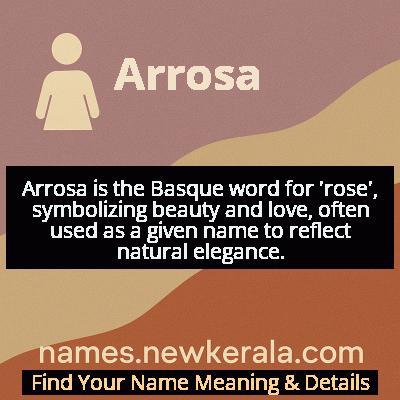Arrosa Name Meaning & Details
Origin, Popularity, Numerology Analysis & Name Meaning of Arrosa
Discover the origin, meaning, and cultural significance of the name ARROSA. Delve into its historical roots and explore the lasting impact it has had on communities and traditions.
Name
Arrosa
Gender
Female
Origin
Basque
Lucky Number
9
Meaning of the Name - Arrosa
Arrosa is the Basque word for 'rose', symbolizing beauty and love, often used as a given name to reflect natural elegance.
Arrosa - Complete Numerology Analysis
Your Numerology Number
Based on Pythagorean Numerology System
Ruling Planet
Mars
Positive Nature
Generous, passionate, energetic, and humanitarian.
Negative Traits
Impulsive, impatient, moody, and can be overly emotional.
Lucky Colours
Red, maroon, scarlet.
Lucky Days
Tuesday.
Lucky Stones
Red coral, garnet.
Harmony Numbers
1, 2, 3, 6.
Best Suited Professions
Military, sports, philanthropy, leadership roles.
What People Like About You
Courage, energy, leadership, generosity.
Famous People Named Arrosa
Arrosa Erostarbe
Actress
Known for her roles in Basque-language films and television series
Arrosa Uria
Writer
Authored several collections of Basque poetry focusing on nature and feminine identity
Arrosa Mendizabal
Cultural Activist
Founded the Basque Language Preservation Society in the 1990s
Name Variations & International Equivalents
Click on blue names to explore their detailed meanings. Gray names with will be available soon.
Cultural & Historical Significance
The cultural significance of Arrosa extends beyond political contexts into everyday life and celebrations. In Basque weddings, roses often feature prominently in bouquets and decorations, making the name Arrosa particularly meaningful for girls born around family celebrations. The name also connects to the Basque tradition of 'lorategi' (gardening), where roses hold special importance in both rural and urban households. During the annual San Fermín festivities in Pamplona, red roses symbolize both the celebration's vibrant energy and the more solemn religious processions, demonstrating how the flower - and by extension the name - bridges secular and sacred aspects of Basque culture.
Extended Personality Analysis
Women named Arrosa are often perceived as possessing a delicate strength, much like the flower itself - beautiful yet resilient. They typically exhibit nurturing qualities combined with quiet determination, often serving as emotional anchors in their families and communities. Many Arrosas display artistic sensitivity and appreciation for beauty, whether expressed through visual arts, music, or literature. Their personality often balances traditional values with progressive thinking, reflecting the Basque culture's unique position between preservation and innovation. They tend to be deeply connected to their roots while embracing modern perspectives, creating a fascinating blend of steadfast loyalty and adaptive intelligence that makes them both reliable and inspiring companions.
Beyond these general characteristics, Arrosas often demonstrate remarkable emotional intelligence and diplomatic skills. Like the rose that requires careful cultivation, they understand the importance of nurturing relationships and creating harmonious environments. However, they also possess the 'thorns' of strong personal boundaries and convictions, unwilling to compromise their core values. This combination makes them excellent mediators and community builders. Their connection to nature and tradition often manifests in practical skills - gardening, cooking traditional recipes, or preserving cultural knowledge - while their modern adaptability allows them to excel in contemporary professional environments. The name seems to carry an expectation of grace under pressure, and most women named Arrosa grow into this expectation naturally.
Modern Usage & Popularity
In contemporary times, Arrosa maintains steady popularity within Basque-speaking communities while gaining recognition internationally as parents seek unique floral names with cultural depth. The name has seen a modest resurgence since the 1990s, coinciding with the revitalization of Basque language education and cultural pride through initiatives like ikastolas (Basque-language schools). While not among the top 100 names in Spain overall, it ranks consistently within the top 50 female names in the Basque Autonomous Community, particularly in provinces like Gipuzkoa and Bizkaia where Basque language usage is strongest. Internationally, Arrosa appeals to parents interested in botanical names who want something less common than Rose but equally meaningful. The name's usage has expanded beyond the Basque diaspora as global naming trends favor culturally specific and meaningful names over generic options. Social media and international name databases have contributed to its gradual globalization, though it remains most popular among families with Basque heritage or particular interest in European minority cultures.
Symbolic & Spiritual Meanings
Symbolically, Arrosa represents the complete life cycle - from bud to full bloom to eventual fading - making it a powerful metaphor for human experience and the passage of time. The rose's thorns symbolize protection and boundaries, suggesting that beauty and strength often coexist and that true grace includes the wisdom to establish limits. In Basque cultural context, the name carries additional layers of meaning related to endurance and cultural survival, much like the wild roses that thrive in the rugged Basque landscape despite harsh conditions. Like the rose that returns each spring, Arrosa symbolizes resilience and the ability to thrive despite challenges, reflecting the Basque people's historical experience of maintaining their identity through periods of political and cultural pressure. The name also embodies the concept of 'hidden beauty' - much like the rose's fragrance isn't immediately apparent but reveals itself gradually, women named Arrosa often demonstrate depth and complexity that unfolds over time. This makes the name particularly meaningful for parents who value both aesthetic beauty and substantive character in their naming choices, representing a hope that their daughter will combine external grace with inner strength and wisdom.

